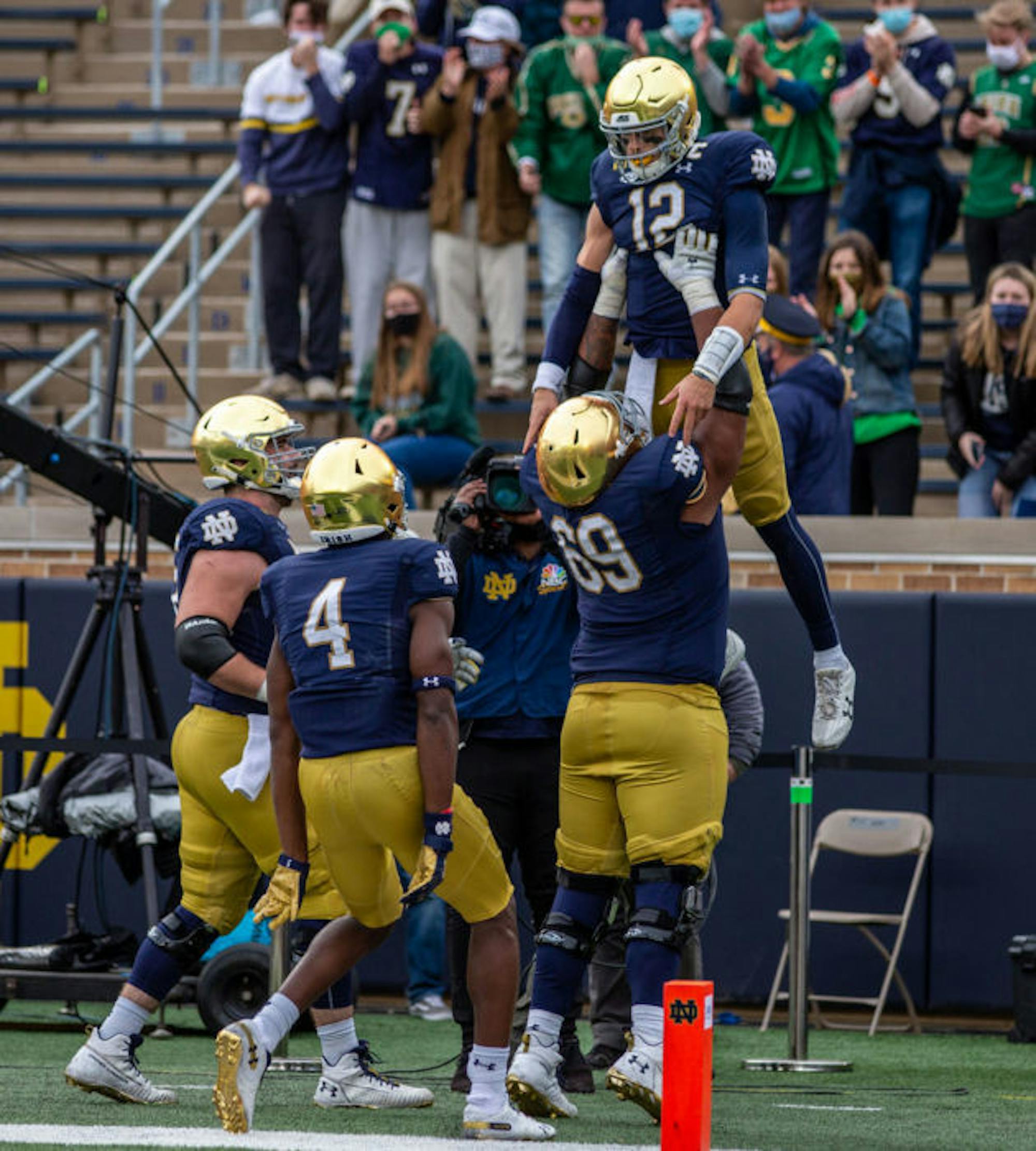My seasonal affective disorder is starting to creep in again. And no, this iteration does not have anything to do with the weather.
Brian Kelly, I’m looking at you.
My old age has made me soft this year. I’ve been trying my best to look at the season with a brighter perspective than I have in the past. But Notre Dame football is doing its very best to test my patience, and I don’t love the toll it’s taking on my emotional well-being.
The USF and Florida State games gave me a lot of hope — those are the kind of decisive wins that teams who are serious title contenders pick up. The latter victory looks even better in light of the Seminoles’ defeat of then-No. 5 North Carolina; the Tar Heels have been touted as the third-best team in the ACC and the second-best team on Notre Dame’s schedule. The Irish seemed to be firing on all cylinders on both sides of the ball, and the ground game seemed to make for an offense that could call itself “run-first” and be taken seriously.
Then I was forced to bear witness to last Saturday’s game against Louisville.
I would like to take this opportunity to apologize to my good friend Mike Moreno, who I told to take the easy over on a 60-point over/under. Sorry Mike — I kind of feel like I personally should pay you back the $5 you lost on that gamble. The only time I’ve ever seen a sporting event with such discrepancy between the predicted score and the actual score was when I was in elementary school and my basketball team didn’t score a single basket the entire game.
In all seriousness, there are some real causes for offensive concern following last week’s 12-7 win.
Ian Book doesn’t seem to be doing much to address the questions surrounding his own inconsistency. Week one, I blamed it on first-game jitters. Games two and three, things were still disjointed on the passing front, but the ground game was solid enough to assuage my fears. Game four, I am running out of excuses. Book’s completion rate of 57.9% is the first time he’s slipped under 60% this season, meaning the pass game was tolerable, but nothing to write home about.
Let me be clear — in the grand scheme of college football, Book is extremely competent. His adjusted quarterback rating, a metric out of 100 designed to rate efficiency and adjusted for defenses faced, is 69.8. That’s 23rd in the nation. In number of points contributed and total expected points, he’s top 30. In terms of expected rushing points, weighted for clutchness, he’s top 10.
The problem? That in the same clutch-weighted metric for passing, he’s 46th. Phil Jurkovec is fifth.
Book’s scrambling is fine — I’d venture to say it’s even improved. He can use his legs in a fairly shifty and efficient way — we can all picture one of his signature sideline prances after tucking the ball when his down-field looks are not there. But in games where neither the offensive line nor the running backs are performing, that’s not going to cut it.
Book attempted just six passes over 10 yards against Louisville, and completed just one of them. Adjusting his completion rate accordingly, that’s less than 17% from over ten yards and more than 76% from under. Though the latter stat is encouraging, the former is anything but. With gritty backs that are typically efficient in short-distance, Notre Dame doesn’t need to rely on short throws as much as it has in years past. In contrast, deep threats like Javon McKinley and Kevin Austin Jr. need to become just that: deep threats. It’s not necessarily that they’re not there — it’s that they’re not being targeted.
I recognize that Book is not the only one to blame here. The four sacks Louisville mustered point to some issues on the offensive line, and his vertical receivers have to extend the viability of their routes. But either way, if the success of this season is going to be determined by that pesky Nov. 7 matchup, the entire offense is going to have to sort the passing game out in the weeks between now and then. After all, you play like you practice.
I would be remiss if I didn’t acknowledge it was a fairly stout defensive effort from the Irish last week, allowing just seven points, 233 yards and less than 24 minutes of Cardinals possession. But Malik Cunningham had his way to some extent, foreshadowing problems that could exist in future games against superior quarterbacks (anyone coming to mind?). But on the bright side, that seems like a problem that is relatively fixable.
So I’ll end it on that note, since it’s a fairly happy one. I am really trying to have a brighter outlook this year — Notre Dame, please don’t make it hard on me.













